feature image by Ana Grillo for Frameline
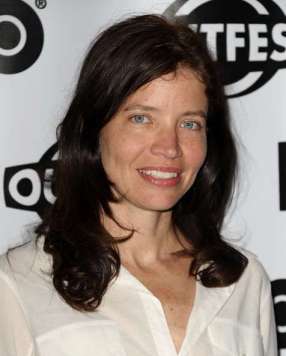 You know Jamie Babbit. She’s the director who brought you all of your favorite queer films: But I’m A Cheerleader, Itty Bitty Titty Committee, The Quiet, and her latest, Breaking The Girls. She’s directed episodes of The L Word, Girls, Gossip Girl, Gilmore Girls, United States of Tara, and Castle, to name a few. She’s also on the board of directors for Power Up, a non-profit production company whose mission is to increase the visibility of lesbians in entertainment and media. Her oeuvre is queer-conscious, feminist-conscious, simultaneously super intelligent and super fun; if her work was a lady, you’d already have proposed by now. Suffice to say, Jamie Babbit is a rock star, and Autostraddle contributor Kate was pretty giddy over the opportunity to interview her. We talked about being a queer filmmaker, guilty pleasure movies, and the complicated politics of sex scenes.
You know Jamie Babbit. She’s the director who brought you all of your favorite queer films: But I’m A Cheerleader, Itty Bitty Titty Committee, The Quiet, and her latest, Breaking The Girls. She’s directed episodes of The L Word, Girls, Gossip Girl, Gilmore Girls, United States of Tara, and Castle, to name a few. She’s also on the board of directors for Power Up, a non-profit production company whose mission is to increase the visibility of lesbians in entertainment and media. Her oeuvre is queer-conscious, feminist-conscious, simultaneously super intelligent and super fun; if her work was a lady, you’d already have proposed by now. Suffice to say, Jamie Babbit is a rock star, and Autostraddle contributor Kate was pretty giddy over the opportunity to interview her. We talked about being a queer filmmaker, guilty pleasure movies, and the complicated politics of sex scenes.
Movies like But I’m A Cheerleader and Itty Bitty Titty Committee are two of those movies that I feel every queer person I’ve ever met has seen, and has really strong feelings about. Do you feel a pressure to keep making very queer films, or is that something you readily accept?
I’m totally okay with it. I feel no pressure — in fact, I embrace subjects that I am interested in. Movie projects are a two or three year commitment so I have to be interested enough in the material in order to stay around for the three years it takes to get it going. But I’m A Cheerleader is partly my life story because I grew up in a rehab — my mom ran a rehab — so I was very invested in it. And Itty Bitty Titty Committee — I was a wannabe riot girl in the early 90s, so that was also very personal. In terms of Breaking the Girls, I always wanted to make a movie like Basic Instinct or Wild Things. I love that genre, so I was really psyched when that project came around. I don’t feel any pressure to be anything but interested in the material enough to direct it.
That passion definitely comes through. And on the other side of that, you’ve directed episodes of popular television like Castle and Gossip Girl. I always find it funny that the 16 year old me who was obsessed with Gossip Girl was the same person who three years later said “But I’m A Cheerleader is my movie!” It’s interesting you’ve had a hand in both of those things because they’re so different and yet they inspire the same kind of intense following. What is it like to strike that balance between independent film and very commercial television?
A lot of it is driven by a very pragmatic thinking and feminist thinking. When I was going to Barnard and realizing the reality of my life as a lesbian, I realized the reality of my life as a lesbian is that I’m going to be poor.
I hear that, sister.
I don’t want to be poor and I actually would like to earn a living, but I also would like to have a creative life. I have a very expensive habit, which is making independent films, and I supplement my independent film habit by working in commercial TV. It’s a nice balance that I’ve found. I learned pretty early from director mentors that I had, like David Fincher, who I worked with early in my career. He was making movies but he was also directing commercials. Gus Van Sant, another idol of mine, also directed commercials for money, but obviously made movies he cared about.
I was also very blessed that my ex-girlfriend was a very successful independent film producer, and I saw how many of the independent film directors were flat broke at 50 and didn’t have health insurance, and I didn’t want to do that. I wanted to be able to take care of myself. I wanted to have a family and support my family, and that’s all really important to me, but I also would never sell out on doing work I really care about.
And the good thing about directing television as opposed to commercials, which actually most directors do, is that I got to actually work with actors. Commercials aren’t really about working with actors; it’s more about visual pleasure, one shot at a time, and the nice thing about TV is that there’s some visual pleasure, but it’s kind of the same pace as independent movies. I’ve been blessed by making enough movies that I know how to move really quickly to keep up with the TV schedule. But I also get to work with some of the best actors, like Alison Janney or Toni Colette, people I’ve always wanted to work with, and it’s been awesome to work with them in TV.
Do you think you have a preference now that you’ve done both?
You know, I really don’t. I actually think they feed off each other. I really like TV and the immediacy of it. I like that I read the script and two weeks later I make it, and a month later it’s on the air and born into the world. I also like making movies because it’s three years in the making so you get to be obsessed with it. You get to pick every person that works on it, and you get to obsess about the details because you have a lot of time. I like them both. I wouldn’t be happy if I was just making indie movies, and I wouldn’t be happy if I was just doing TV. I like the mix.
Tell us about Breaking the Girls. Autostraddle had a lot of feelings about this film.
I’ve always been one of those lesbians that loved movies like Basic Instinct. It came out when I was in junior high, and I remember gay people in San Francisco were protesting, saying it was a horrible movie where bisexuals are evil, blah blah blah. I always loved it, and when Wild Things came out, I said ‘Oh my god, I love this movie!’ I’ve always had my guilty pleasures, and that genre is one I secretly really liked. Those movies are always polarizing, and I know that, that’s fine. But I wanted Breaking the Girls to be fun. That was the most important thing to me, that it had crazy twists and turns.
Someone in San Francisco when they showed it there was like, you know, that guy in the movie was so nice and all the lesbians were evil and this is an anti-feminist movie. Usually it’s the girl who plays the boring nice wife who has all the sweet scenes and is totally boring, and I wanted the guy to have the boring flat scene and the three girls have the exciting complex roles. I don’t think the movie is anti-feminist; I think it’s three great roles for women. It’s Strangers on a Train, where the guy who plays the Madeline Zima part won an Academy Award. I think Patricia Highsmith would have liked to have written Strangers on a Train with women, [as] the butch lesbian she was, but since she was closeted and freaked out about writing anything even remotely gay, Strangers on a Train turns out to be about a bunch of guys. I also really liked the idea of remaking Strangers on a Train in a form that Patricia Highsmith would enjoy.
I’m all about making the men as boring as possible, so that’s totally fine. And I remember when I was watching it, I thought it was so much fun. It’s dark and complex but it has that summer fun blockbuster feel to it.
It’s supposed to be just a fun ride. I don’t know, that’s exactly what it’s supposed to be. And just when you think you feel like you know what the puzzle is, it’s something different. And ultimately, in the end all the puzzle leads to is [SPOILER ALERT] these two sisters who get exactly what they wanted, which is to avenge their mother.
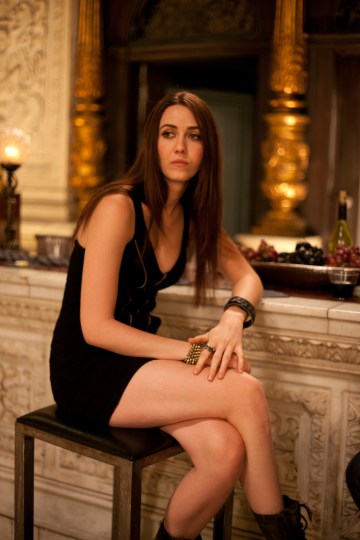
A lot of people wanted to know who’s gay in the movie. I think Agnes, the lead, is bi, and if anything she’s too fucked up to know what she is. I think Kate Levering’s character who says the sex with the man is disgusting – and she says at the end of the movie that she never wants to see a dick again – she’s definitely gay. I think Madeline Zima’s character is definitely gay. At the beginning we think she’s this crazy bisexual killer, but she’s a lesbian who’s put in jail by her lesbian lover. And her lover says in the last scene, she’s the only one I ever loved and I put her in jail for the rest of her life. It does end up with a tragic ending. But it’s supposed to celebrate all those ridiculous genres of movies I loved to watch. It’s a thriller, and I expected people who loved that genre to be super into it and have a good time, but I didn’t expect people who like Claire of the Moon or Bar Girls to like it, and that’s fine.
It’s funny because I feel like all of your work has that funness to it. When I mention your work to people, they always say “Jamie Babbit! Her movies are hilarious!” And Breaking the Girls is not hilarious. I mean, I laughed, but people are also getting killed and all that.
I laugh when I watch it because it’s so ridiculous. It’s not a comedy, but there’s definitely a sense of play.
What is it like directing something that is essentially not a comedy?
It’s really fun to play in that genre [of thriller]. I found it really fun to watch old Hitchcock movies. As my inspiration, I got to watch Basic Instinct and Wild Things again so it was a fun research process for me to take the elements I really liked. I had a great time with it. Guinevere Turner and I worked on the script around my kitchen table. We were just laughing and having so much fun thinking about the twists and turns, how ridiculous it was getting.
I think with American Psycho people think ‘Oh, it’s a terrifying movie’, but Gwen Turner has such an amazing sense of play. I remember watching it and thinking, ‘This is so funny’. It’s a fucked up movie, but it’s so funny.
I’m always glad to hear that people who make ridiculous movies are aware of the fact that they’re making ridiculous movies.
Oh, they’re so aware of it.
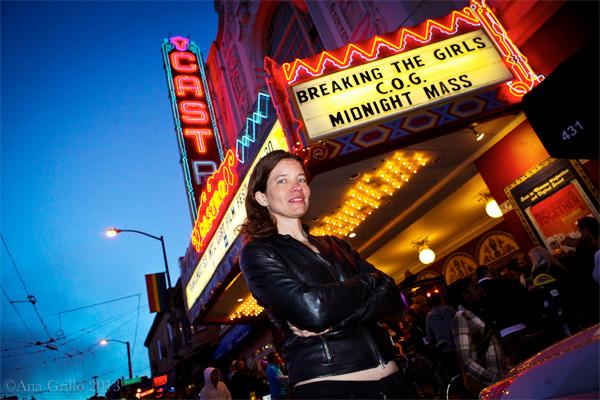
You’ve named a lot of people as inspirations, but who are some favorites?
I go through phases. I used to be really into Cindy Sherman. I had a big Tim Burton phase. I really like Alexander Payne. I love Jane Campion. Those are artists where I’ll always be interested in what they’re up to. I love Marilyn Minter. I think she also has a great sense of play and her work is colorful – there’s a gay sense to them in a fun, twisted, fucked-up way. One of the first TV people I worked with was Ryan Murphy, who I also think has a sick sense of humor. From American Horror Story to Glee to Popular, you can see he definitely has a fucked up sense of humor like I do.
You’ve been involved in projects with lots of sexuality and sex scenes, particularly lesbian sex scenes. How do you direct a queer sex scene?
I am really into directing sex scenes. I really like it. There was a time in my life when I really wanted to direct a really good European porny movie that was about real people and real sex, because I feel like that’s something we don’t see enough. I think that’s actually something Lena Dunham does really well on Girls, really exploring the intimate and fucked up and uncomfortable and tragic and all those things about sex. I’m super into it, and I’m also kind of pervy, so I’m into it for that reason, too. As far as lesbian sex scenes go, it’s always the challenge of trying to get girls to let themselves be vulnerable, emotionally and in terms of getting their clothes off. That’s always an issue because no one wants to show anything. And there’s plenty of ways I know how to shoot around things if they’re not comfortable, but I really worship the fact that the sex scenes on Girls with Adam Driver and Lena have real nakedness, real awkwardness, are really hot but really fucked up, all those things. That’s a pleasure for any director to be able to work with that.
On The L Word I directed a lot of sex scenes, and I liked it because the girls had so much lesbian sex on the show, they would just take off their clothes and say ‘Okay, what Canadian bass player am I having sex with today?’ At least we didn’t have to have five hours of conversation to convince them; they were just ready to go.
On Breaking the Girls, sex is power; the girls use sex to get what they want. Even Madeline’s character, she seems bisexual, but I think she was pretending to be bisexual at first so she could get Agnes in the pool and then she was gonna terrorize the guy out of the pool so she could have sex with the girl. I’m really interested in the politics of that.
Complicated sexuality is so interesting. Do you have any favorite directors or artists who work with similar material?
Jane Campion, for sure. The Piano has a really complicated sexual politics where it’s a story about a woman who uses sex to get her piano back. She’s essentially exploited sexually, and then she actually loves it and falls in love with her exploiter. I find that really complicated and interesting. And definitely in her newest one, Top of the Lake. It’s really complicated and fucked up; everyone’s in love with and fucking someone who’s a predator. I love how dark her sexuality is. There’s women living on a commune because they’re anti-men, but they’re having sex with the sleazy drug dealer in town.
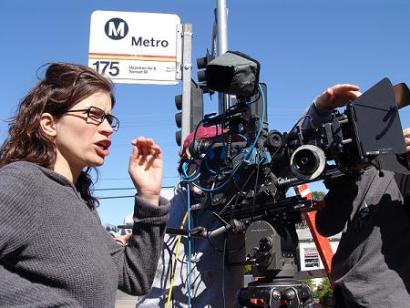
I love survivor revenge narratives. In Top of the Lake, that’s happening in a very complex way, but it also happens in Breaking the Girls in a much more obvious way, which I loved. It’s not explicitly a survivor revenge story, but it’s about girls taking the weapons that were used against them and then turning them on the men, which I love.
I’m totally into girl revenge stories.
Which is a little sick and awesome of us, totally.
There’s a whole library of stories like that that are just really great.
So last but not least, are there any big projects coming up that we didn’t talk about?
I’m working on a new project that’s called Cleveland. I was born and raised in Cleveland. It’s about two sisters, one gay and one straight – actually a girl who’s just out of sex rehab, and it’s basically about the sisters’ friendship and their relationship. That’s back to comedy, so that’s the next thing I’m working on. It was written by my girlfriend who’s a writer on Portlandia, and she also wrote on South Park and Arrested Development. She’s another indie-tv crossover with a funny sense of humor.
I’m eventually directing an HBO pilot for Lorne Michaels. It’s another comedy that’s about two black young reporters working at a crappy newspaper in Atlanta that’s very, very funny. I’m excited about that, too.
You can watch Breaking the Girls on IFC on Demand, or on other VOD outlets, such as: iTunes, Amazon streaming, Xbox, Google Play, PS3 and Nook.



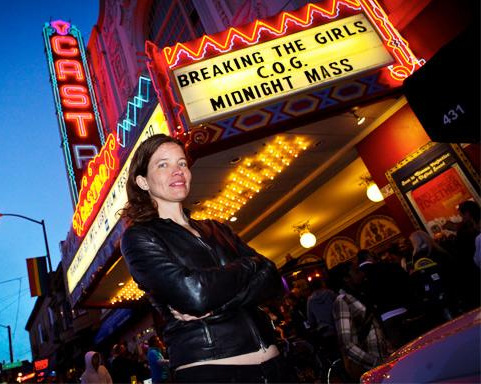
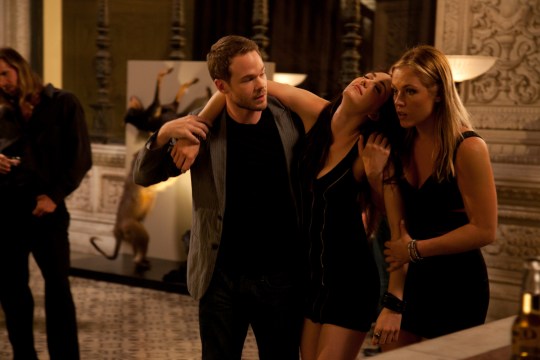




Comments
I’m really into girl revenge stories.
Yes, a million yesses! Thank you for your great interview with Jamie Babbit. She’s such a great director. This is a good start to the weekend.
I’m still not interested in seeing this movie but Jamie is awesome. I also have to thank her for always directing the best episodes of Rizzoli & Isles. She never lets us down with those.
Wait, what is this Lorne Michaels comedy she’s directing about two black reporters. Why haven’t I heard of it. Off to the google machine.